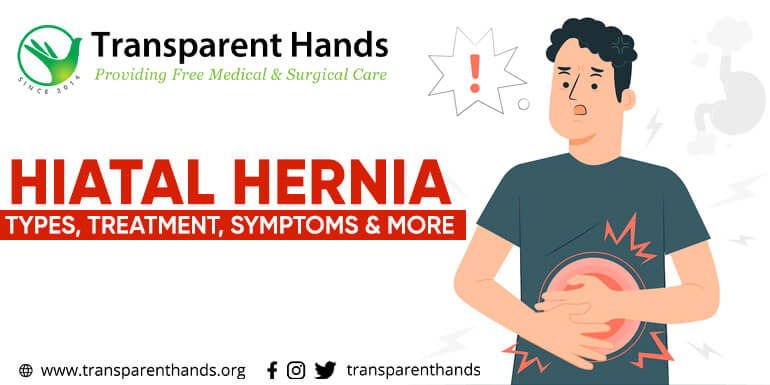Hiatal Hernia: Types, Treatment, Symptoms, & More!

Hiatal hernia is a condition that occurs when the upper portion of the stomach protrudes through the big muscle that divides the chest from the abdomen (diaphragm). When a person suffers from a hiatal hernia, the abdomen protrudes into the chest as a result of pushing through that opening.
What are hiatal hernia types?
The sliding hernia and the paraoesophageal hernia are the two most common hiatal hernia types. When a person has a sliding hiatal hernia, the abdomen and the part of the esophagus that connects to the stomach move upward through the hiatus and into the chest. This is one of the most typical types.
What are hiatal hernia causes?
The body develops it when the tissue in the abdominal wall weakens to the point where it enables the stomach to protrude through the diaphragm. It is seldom obvious why things like this take place. However, a hiatal hernia could be brought on by modifications in the diaphragm that come with advancing age. Some other hiatal hernia causes may include trauma to the region, as well as certain types of surgical procedures, which can also cause serious injury to the region. Other reasons include being born with an abnormally large hiatus, and constant or intense pressure, e.g., when coughing, throwing up or lifting large objects.
What are hiatal hernia symptoms?
The majority of small hiatal hernias do not produce any signs or symptoms. But bigger hiatal hernias symptoms include the regurgitation of previously swallowed food, the acid from the stomach flowing backward into the esophagus, heartburn, having a hard time swallowing, discomfort in the chest or the abdomen, and uneasy and shallow breaths. Other symptoms include feeling full quickly after eating, vomiting of blood, and passage of black stools which may suggest bleeding in the digestive tract.
How is a hiatal hernia diagnosed?
Heartburn, abdominal pain in the upper region, or pain in the chest can frequently be traced to a hiatal hernia, which is typically identified during an examination or procedure designed to identify the root cause of these symptoms. These processes or examinations include the following: upper endoscopy, and a radiograph of the upper portion of the digestive system. Manometry of the esophagus can also help assess how well the esophageal muscles can contract.
What are some of the hiatal hernia treatments?
The treatment can be surgical or non-surgical. The majority of individuals who have a hiatal hernia will not have any signs or symptoms and will not require treatment because of their condition. If someone has signs and symptoms, they require medication or surgery to treat their condition.
Are there any medicines for hiatal hernia?
Antacids are medications that reduce the acidity of the stomach. Antacids may provide pain alleviation. Proton pump inhibitors that are available without a prescription may also help. An overdose of certain antacids can result in adverse effects such as diarrhea and, in rare cases, issues with the kidneys, so it is important to consult your doctor about the dosage.
Are there different kinds of surgery options for hiatal hernia treatment?
During a surgical procedure to restore a hiatal hernia, the surgeon may move the stomach lower into the abdomen, reduce the opening in the diaphragm by cutting it smaller, or reconfigure the esophageal sphincter. Either a thoracotomy or laparoscopy may be used to operate. During laparoscopic surgery, the surgeon will make a series of tiny cuts in the abdomen through which they will put a miniature camera and specialized surgical instruments. After that, the procedure will be carried out while the surgeon watches pictures of the inside of the body being showcased on a monitor screen.
Is hiatal hernia life-threatening?
Cases that pose a risk to the patient’s life are incredibly rare. When they do occur, they are typically among patients who also have other medical conditions, such as incarcerated para esophageal.
Who should get surgery?
Surgery is required in some cases to repair a hiatal hernia. Surgery is typically recommended for patients who are unable to find relief from heartburn and acid reflux through the use of prescription drugs, or who have difficulties like inflammatory reactions or shrinking of the esophagus.
How long does it take to heal from surgery?
Recovery after laparoscopic surgery typically only takes a few weeks. In contrast, recovery time after an open surgery can be several months.
Is Hiatal Hernia a common condition?
Hiatal hernias are very prevalent. People over the age of 50 are disproportionately affected by this health problem. This illness can also be present at birth in a child (congenital).
Is hiatal hernia surgery costly?
The price of surgery varies considerably depending on the physician you choose and the location of the hospital.
Is hiatal hernia treatment painful?
After surgery, you might experience some soreness and discomfort in your stomach for a few weeks.
Are there any home remedies for Hiatal hernias?
Eating smaller meals, maintaining a healthy weight, and avoiding smoking are a few things that patients may do to ease their pain.
Transparent Hands has been raising funds to provide free hernia surgeries to underprivileged patients in Pakistan who cannot afford to pay for their treatments due to financial constraints. Donate today.
(The information in this article should not be taken as a substitute for professional medical advice.)
Alos Read










Leave Your Comments